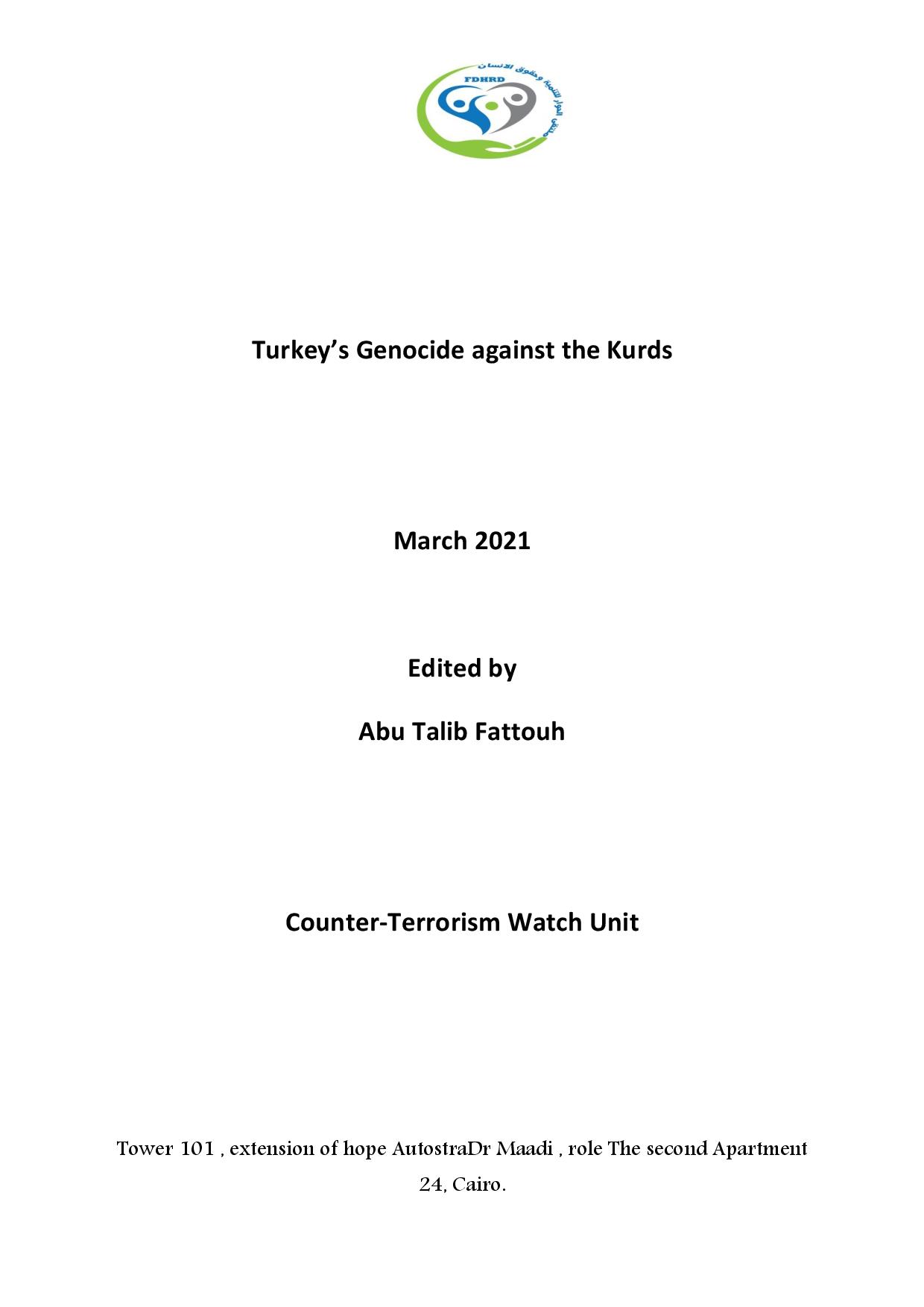Tuesday, March 30, 2021
Press Release
———————————————–
On Sunday, March 28, 2021, the “Counter-Terrorism Observatory” of the Forum for Development and Human Rights Dialogue issued a report entitled “Turkey’s War of Extermination against the Kurds.”
The report noted that the Kurds had been subjected to historical injustice that prevented them from establishing a state in the mapping phase, and had been subjected to the injustice of regimes that they had long tried to humiliate, in the hope of finding an opportunity to realize their dream, and were often also the victims of false calculations and bets.
The report stressed that Turkey realizes that without resolving the Kurdish issue it cannot realize its dreams of being an influential regional, international and economic power.
With regard to the current situation in Turkey and its policy towards the Kurds, the report stated that what Turkey really fears is not the Kurds in Iraq and Syria, but the Kurds inside Turkey, as any rise of Kurdish power in the two countries is an internal threat to it, because it may awaken Kurdish ambition within Turkey to claim full citizenship rights, and believes that this poses a threat to Turkish national identity.
With regard to the historical background of Turkish-Kurdish relations, the report noted that Turkish policy is the same towards its minorities, either identity or extermination, and the Kurds are in a situation similar to the Massacre of Armenians, as history has brought on them those crimes against humanity committed by the Ottoman authorities between 1915 and 1916.
The report also stated that Turkish President Recep Tayyip Erdogan has made the war a political game that he exploits in political decisions, positions and hypotheses that become more important as the elections approach, and surrounded the army by playing with laws and limited rules, which is a strong new basis for playing modern war that depends on players from a military perspective.
The Turkish military operation in northeastern Syria came as a new extermination of the Kurds and the drawing of the nature of the land on the war table, and the tactic of exterminating the Kurds through a major role in the development of the game, as a means of improving the image in front of the world, until it reached the level of Western and Arab criticism.
With regard toturkish violations against the Kurds, the report stated that relations between Ankara and the Kurds are not limited to Turkey’s borders, as they monitor the Kurdish people’s gain along their borders in Syria, Iraq and Iran.
In Syria after the United States announced its withdrawal from northern Syria, thus allowing Erdogan to launch a military offensive on the region, Erdogan justifies this military operation as coming in the context of fighting “terrorists,” and the Turkish government wants to move the conflict between it and the Kurds into Syria, taking advantage of the military vacuum created by Donald Trump’s decision to withdraw U.S. troops from northern Syria, and the government of Recep Tayyip Erdogan here follows the same violent approach that has employed him repeatedly against the Kurds.
What the Syrian Kurds are exposed to at the hands of Erdogan, after President Donald Trump abandoned their protection, this is not new in the history of the Kurds, nor in the history of their movement distributed on the map of the region, a history of (betrayals) that have hit them from all directions.
In Iraq, with more military bases and an increase in the number of troops and troops in northern Iraq, this is in the one direction of securing what Turkey claims to be its strategic interests, led by confronting the Kurds in Iraq and Syria.
Over the past five years, more than 3,000 PKK members have been killed in addition to 500 civilian casualties, and Turkish ground forces have been penetrating into the territory of The Kurdistan Region of Iraq more than 10 kilometers deep, near the border area of Batoufeh north of Dohuk province, and the Turkish ground incursion was preceded by aerial bombardment. Eight Kurdish border villages in the Haftinin area near the mountain strip between Iraq and Turkey were heavily artillery, causing the displacement of families from villages and causing material damage to farmers’ fields in those villages, as part of the so-called “Tiger Claw” operations, which target PKK-affiliated positions.
With regard to Turkey itself, a number of Kurdish-language media outlets have been shut down as a threat to national security, as this was also the case with a Turkish-language television station that covered only issues within the Kurdish region, and the HDP has recently been subjected to a relentless crackdown since 2016 when its leader Salaheddine Demirtaş was arrested.
With regard to the United Nations and its position on Turkey on the Kurdish issue, the report stated that the United Nations and several international bodies had sent fact-finding committees to investigate the human massacres committed against the Kurds, but that the Turkish government had prevented them from carrying out their mission and had not allowed them to roam kurdish areas nor had they been able to talk to Kurdish citizens.
UN reports, as well as Kurds in Syria, have accused the Turkish army of committing crimes of ethnic cleansing and demographic change in the Afrin region, controlled by Turkey by its forces and allied militias, which a UN report accused of “war crimes” in Afrin, amid repeated threats from Ankara to launch a large-scale operation against Kurds in northern Syria.
With regard to Turkey’spractices against international law, the report stressed that Turkish practices in Syria were a flagrant violation of the UN Charter and the rules of international law, and the European Union called on Turkey to stop bombing Syrian territory, refrain from further complicating the efforts of international powers to stop hostilities, and urged Turkey to comply with international law in Syria.
He also stressed that with the loss of some 30,000 to 40,000 lives in the conflict between Turkey and the Kurds since 1984, this is undoubtedly one of the biggest stigmas in the history of the Republic, and statistics confirm that a number of people forced to emigrate from Kurdistan about one million people not to mention those killed by the Turks and died of illness, old age and extreme weather conditions.








